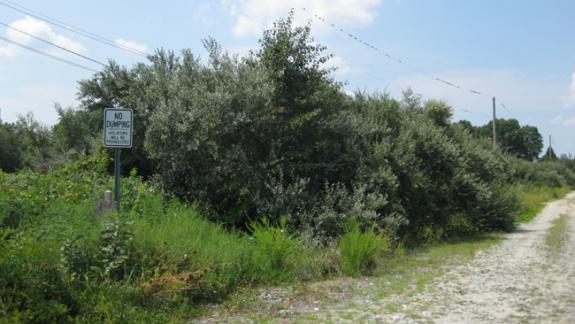Tuckahoe Wildlife Management Area Habitat Restoration Project
Located in northern Cape May County, this site was a former pig farm. Habitat on site has been degraded over the years and invasive species dominate the site.
 Autumn olive is a non-native invasive species in New Jersey. Its berries are eaten by birds and dispersed over wide areas. © Ben Wurst
Autumn olive is a non-native invasive species in New Jersey. Its berries are eaten by birds and dispersed over wide areas. © Ben Wurst
Landowner: State of New Jersey, Division of Fish and Wildlife – Tuckahoe WMA
Landscape Area: Delaware Bay Landscape Conservation Area
Location: Upper Township, Cape May County, NJ
Watershed Area: Great Egg Harbor, Tuckahoe River
Type of Restoration:
- Invasive species control
- Reforestation
- Warm season grass establishment
- Early successional habitat development (scrub-shrub)
Focal Species:
- Primary – Migratory songbirds and raptors
- Secondary – Grassland nesting birds, grasshopper sparrow, vesper sparrow, bobolink, northern bobwhite, American kestrel
Size: 45 Acres
Permits required: GP16, Habitat enhancement/restoration
Total estimated project cost:
- Grading and ground preparation (including autumn olive & phragmites removal/control) (~ 16 acres) = $22,400
- Warm season grass establishment (14 acres) - $5,400
- Trees/shrubs and planting (27 acres) - $65,000
- Professional services (i.e. site surveys, design, permitting) – $32,000
- Administrative costs - $21,800
- Total project cost: $94,472
Project Urgency: Medium
Significance of Project:
Since acquisition the “Shaw farm” located off County Route 631 in Upper Township, it has provided little value to wildlife. Several different habitat types can be found on the property and include freshwater emergent wetlands, forested wetlands, fallow fields, forests, and a small pond. The old farm has typical traits of early successional invasive species that dominate the area including autumn olive, phragmites, and other species including red maple and cool season grasses. Since the area was farmed, low lying wet areas must have been filled, so there is the potential for wetland restoration. The area also has the potential to provide suitable habitat for migratory songbirds, raptors, and small gamebirds.
Project Description:
 Zoom+ Map of the proposed habitat restoration activities inside Tuckahoe WMA. © CWF
Zoom+ Map of the proposed habitat restoration activities inside Tuckahoe WMA. © CWF
The proposed project will restore approximately 14 acres to early successional grassland habitat and restore 25 acres of forest habitat. Native warm season grasses provide excellent habitat for migratory songbirds and raptors during migration by providing cover and food. Warm season grasses are maintenance free, require no chemicals (fertilization, insecticides), and are drought tolerant. Wildflower meadows also benefit wildlife, especially invertebrates, by providing more food, shelter and nesting habitat. Many other species are attracted to grasslands and meadows, which in turn creates an oasis of biodiversity.
Along the edges of the fields we will create a “soft” forest edge (2 acres) to benefit species that are dependent on scrub-shrub habitat types by stopping succession with the removal of some mature trees and by leaving behind the shrub understory species, like mountain laurel, bayberry, viburnum, and high bush blueberry. This area requires active management to stop the succession back to a forested habitat. Studies have shown the some species prefer this type of habitat over others, which move from one habitat type to another. Some wildlife that utilize scrub-shrub habitats are the common yellow-throat, blue-winged warbler, indigo buntings, yellow-breasted chat, robin, eastern cotton tail rabbit, and deer mice.
Find Related Info: Habitat Restoration






